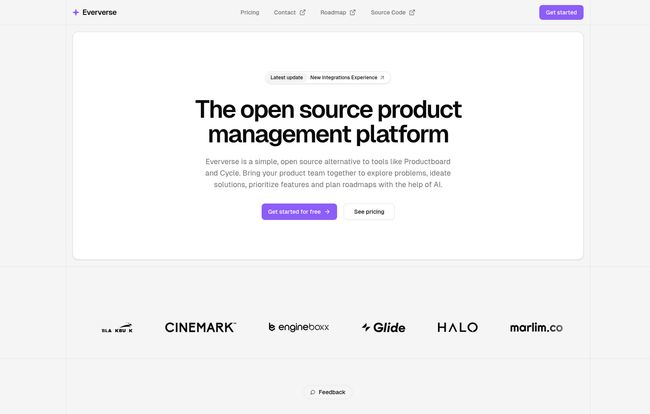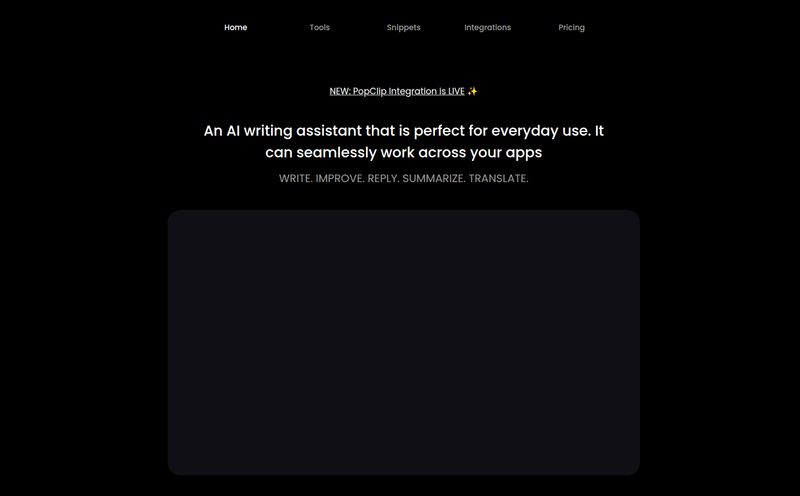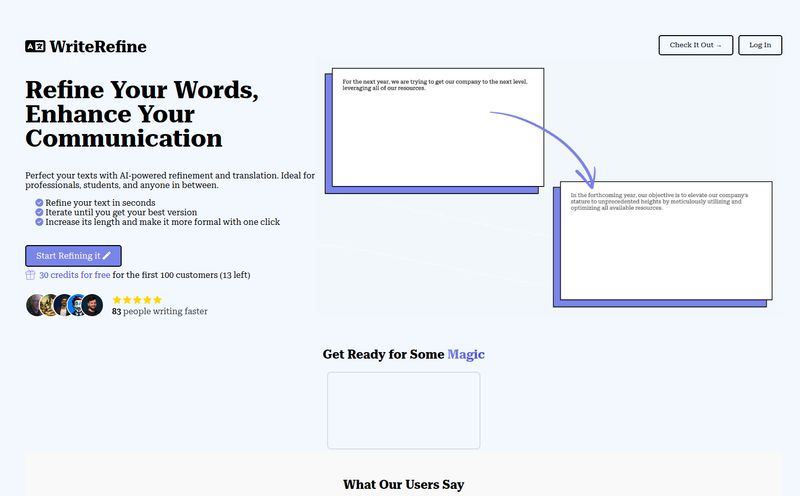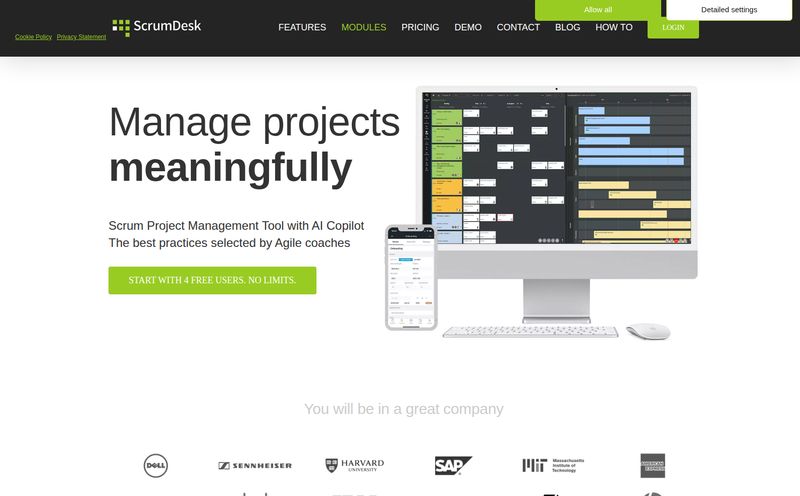If you've ever been a product manager, you know the special kind of organized chaos that defines the role. It’s a world of scattered customer feedback from a dozen channels, endless spreadsheets that were a good idea at the time, and a roadmap that feels more like a wish list than a plan. We’ve all been there, trying to connect the dots between a random Slack message from sales and a critical bug report in Jira, all while trying to plan the next quarter. It's a juggling act, and sometimes, the balls just drop.
For years, we've been promised that AI would come and save us. Mostly, it’s been buzzwords and solutions that create more work than they save. But I think the tide is finally turning. I've been keeping my eye on a new wave of tools that are less about gimmickry and more about genuinely solving PM problems. One that’s caught my attention recently is Eververse. It bills itself as an AI-powered product management platform, and even more interestingly, an open-source alternative to big players like Productboard. So, is it just another drop in the ocean, or is it the life raft we’ve been looking for? Let's get into it.
So, What Exactly is Eververse?
At its core, Eververse aims to be the single source of truth for your product team. You know, that mythical place where all ideas, feedback, problems, and plans live in harmony? That's the goal. It’s designed to help you through the entire product lifecycle: from capturing messy, unstructured feedback to building a beautiful, shareable roadmap.
Think of it as a central nervous system for your product. It takes in signals from all over—customer support, sales calls, user interviews—and helps you make sense of them. Instead of just being a static backlog, it’s a living platform where you can explore problems, brainstorm solutions, and prioritize what to build next. And the secret sauce, the thing that sets it apart, is how it uses AI to do a lot of the heavy lifting.

Visit Eververse
The AI Features That Actually Matter
Okay, “AI-powered” is stamped on everything these days. But I was genuinely curious about how Eververse applies it. It’s not about generating fluffy marketing copy; it's about tackling some of the most tedious parts of a PM’s job.
Taming the Feedback Beast with AI
If you're like me, your customer feedback lives everywhere. Intercom, Zendesk, emails, survey results... it’s a firehose of information. The old way was to manually copy-paste this stuff into a spreadsheet and try to spot trends. It was painful. Eververse comes at this with AI Feedback Summarization and AI Sentiment Analysis. This is cool. It means you can pipe in all that raw feedback, and the platform doesn't just store it; it understands it. It can tell you, “Hey, there’s a lot of chatter about the new dashboard, and the sentiment is overwhelmingly positive,” or “Users are getting really frustrated with the login flow.” It turns a mountain of noise into a clear signal. That’s a game-changer for staying close to the customer without spending your entire week reading tickets.
Your New AI-Powered Writing Partner
We all have to write. Release notes, feature announcements, detailed user stories. And we all get writer's block. The AI-Assisted Writing in Eververse looks to be a solid remedy. It’s not going to replace your strategic thinking, but it can help you get from a blank page to a solid first draft in a fraction of the time. Need to write a changelog update? Give it a few bullet points, and it can flesh it out into a clear, user-friendly announcement. It’s a practical application of AI that just saves time.
Prioritization That’s Less Guesswork, More Data
Ah, prioritization. The most political, gut-feel-driven part of product management. We’ve all used RICE or ICE scoring, but it still feels like we're just formalizing our own biases. Eververse introduces what it calls Predictive AI Prioritization. This is ambitious. It suggests it can help score and rank features based on various factors, likely including alignment with company goals (or 'initiatives' as they call them), customer feedback volume, and sentiment. Now, I’m always a bit skeptical of this. An AI can’t fully grasp business context or strategic pivots. But as a guide? As a tool to challenge your own assumptions and surface opportunities you might have missed? That's incredibly powerful. You still need a human in the driver's seat, but this is like upgrading from a paper map to a GPS.
Beyond the AI: Core Product Management Tools
An AI engine is useless without a solid chassis. Thankfully, Eververse isn’t just an AI toy; it’s a full-fledged product management platform with the foundational features you’d expect.
Building a Coherent Roadmap
The roadmap is your team’s story, and building it in a spreadsheet is like trying to write a novel in Notepad. Eververse has a dedicated Roadmap Creation tool that lets you visualize your plan, organize work into larger initiatives, and customize statuses. You can create different views for different audiences—a high-level one for stakeholders and a more detailed one for the dev team. It connects everything, so when you update a feature, it's reflected on the roadmap. Simple, effective, and a lot cleaner than a slide deck.
Keeping Everyone in the Loop
Half of a PM's job is communication. Eververse has a few features that help with this. The Changelog and public-facing Portal let you easily share what you've shipped and what’s coming next with your users. This kind of transparency builds trust and can even deflect a few support tickets. Internally, the Activity Log provides a clear history of what’s happening, reducing the constant “what’s the status of X?” pings on Slack.
Does it Play Well with Others? (Integrations)
A tool that doesn’t integrate with your existing workflow is a non-starter. Period. This is where Eververse looks really strong. They list integrations with the big ones like Slack and Intercom, but the crown jewel for any product team is the Jira Sync. Being able to push prioritized features from Eververse directly into your development team’s Jira board—and get status updates back—is critical. It bridges the gap between product strategy and engineering execution. Without that link, a PM tool is just an island. With it, it becomes the command center.
Let's Talk Money: Eververse Pricing
Alright, this is often the moment of truth. A tool can look amazing, but if the pricing is out of touch with reality, it's a no-go. I’ve got to say, I was pleasantly surprised here. The pricing model is simple and very accessible.
- Hobby Plan: This is Free forever. You get 1 user, but a surprisingly generous amount of features to get started, including 5 initiatives, AI sentiment detection, and up to 250 triaged feedback items. This is perfect for a solo PM, a personal project, or just giving the platform a thorough test drive without pulling out a credit card.
- Pro Plan: This is where it gets interesting. It's $4 per user/month if you pay annually, or $5 if you go monthly. For that price, you get pretty much everything unlimited—users, initiatives, feedback, features, you name it. Honestly, for small to medium-sized teams, this pricing is incredibly competitive. It's a fraction of what some of the bigger competitors charge.
- Enterprise Plan: This is the standard “Let’s chat” custom plan for large organizations with specific needs like advanced security or dedicated support.
The Pro plan's price point is, in my opinion, its killer feature. It makes a sophisticated, AI-driven platform available to startups and teams that would normally be priced out of this category of software.
My Honest Take: The Good, The Bad, and The "Hmm..."
No tool is perfect, so let's break it down. The good is pretty obvious: the AI-powered feedback analysis is a massive time-saver, the Jira integration is essential, and the price is almost too good to be true. Being an open-source alternative gives it a certain appeal for teams that value transparency and customisation.
On the flip side, like any powerful new tool, there's going to be a bit of a learning curve. You have to commit to changing your workflow to really get the most out of it. And my main caution is about the AI itself. You can't just blindly trust its recommendations. The AI is a powerful advisor, but the product manager is still the CEO of the product. Human oversight isnt just a recommendation; it's a requirement.
Who is Eververse Actually For?
So, who should be signing up for the free trial right now? I think Eververse hits a sweet spot for a few groups. Startups and small-to-medium-sized businesses that are drowning in user feedback and need a smarter way to build their roadmap without breaking the bank. Product managers who are data-curious and want to bring more objective insights into their prioritization meetings. And teams looking for a more affordable, modern alternative to Productboard or Cycle. If you're a massive corporation with decades of ingrained processes, it might be a heavier lift, but for agile teams ready to adopt a new workflow, it seems like a fantastic fit.
Frequently Asked Questions
- Is Eververse a good Productboard alternative?
- Yes, it's positioned as a direct competitor. It's an especially strong alternative if you're looking for a more affordable, AI-focused, or open-source option.
- How does the AI prioritization actually work?
- While the exact algorithm is proprietary, it likely analyzes multiple data points like feedback volume related to a feature, user sentiment, and how well the feature aligns with your strategic initiatives. Think of it as a sophisticated scoring system that provides a data-backed suggestion, but the final call is still yours.
- Can I really use Eververse for free?
- Absolutely. The Hobby plan is free forever and is quite capable for small-scale use or for a thorough evaluation of the platform's core capabilities.
- Does Eververse integrate with Jira?
- Yes, and this is one of its most important features. The two-way sync allows you to push features to your development backlog and track their progress right from Eververse, connecting your product strategy to your engineering reality.
- Is Eververse difficult to learn?
- Any comprehensive PM tool has a learning curve. However, the user interface appears clean, and the workflow is logical. The best way to judge is to use the free plan to see how it fits your team's specific needs before committing.
The Final Verdict on Eververse
After digging in, I’m genuinely optimistic about Eververse. It’s not just another backlog management tool. It’s a thoughtful platform that uses AI in practical ways to solve some of the most annoying and time-consuming problems in product management. It successfully combines intelligent automation with the essential, fundamental tools a PM needs to do their job well.
When you wrap all of that up in a pricing package that is accessible to almost any team, you have a really compelling product. Tools like this represent a shift—not just in how we manage features, but in how we listen to our users and build what matters. For that reason alone, Eververse is a platform I'll be watching very closely, and one I'd encourage any modern product team to check out.



